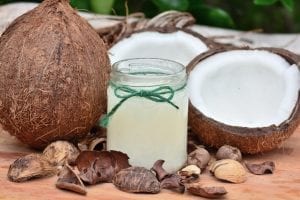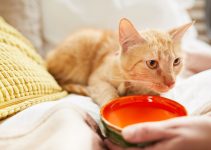Coconut is a very refreshing, and rather expensive tropical fruit that has been proved to be of multi-use. We enjoy coconut milk, its meat, its flavored candy and cakes, and much more. We can also use its oil for many utilities such as skincare routines, hair repair recipes, and body lotions.
However, despite all the benefits that coconuts have for humans, is it the same thing for cats? Do our cats enjoy it as much as we do? Many pet parents wonder about this.
They are confused about the possibility of using coconut, its oil, its water, or any coconut-based products for their cats or include them in their cats’ diets. Therefore, the questions we are left with are the following: is it beneficial for cats? Can coconut oil be toxic for cats? Can my cat have its milk? Finally, can cats have coconut?
NOTE: We want to inform our blog readers that before we publish any article, the team “Proudcatowners” does deep research based on experience and knowledge about cats and everything related to them, to guarantees reliable and precise information, satisfy the readers is our first priority.
Can cats have coconut
Coconut is used to create so many things such as coconut milk, water, and even coconut meat. As much it gets confusing to choose what to eat, many pet parents are also confused about whether or not they can feed it to their cats.
Sometimes, your little paw friend would want to share your tropical treat with you. Many pet parents said that their cats enjoyed stealing some coconut from them, and they confirmed that as long as it is in limited and small quantities, it would not cause any notorious harm to your cat.
However, the skin and milk can cause some danger to your cat, especially if it consumes too much of it, or it is included in its daily diet. It is okay for cats to have coconut, but it must be provided to them moderately and occasionally, and it can still cause some minor digestive problems for your cat.
Is coconut beneficial for cats
We cannot deny all the benefits it has on us as humans, however, coconut and coconut-based products might not all have the same effect or benefit on our feline friends. Many products add a great asset to your cat’s health, while other products might endanger it.
Coconut meat
The meat is the soft white part of the coconut that is in the middle; we can shred it, peel it off, or eat it in the way you see fits. If your cat catches you enjoying some delicious snack with your that in hand, it might want a bite or two.
Although it is not toxic for cats to eat coconut meat, it is still advised against. There is no harm in allowing your cat to try on some fleshy part of your tropical fruit; however, you must be careful with the amount you will allow it to consume. this fruit is considered a high-fat fruit, so too much of it would upset your cat’s stomach, and the mess it could lead to is not worth that small treat you allowed your cat to have.
Coconut milk
Although coconut milk is a refreshing beverage that we all love, and many choose to consume this milk instead of cow milk, for example. Just like some humans, cats are also intolerant to lactose; therefore, we find ourselves wondering if this milk could help with our cat’s intolerance towards lactose and solve the dilemma of dairy products such as cow milk.
Unfortunately, it is useless to get your hopes up. Coconut milk is made by soaking its meat in water and then straining it, which gives us that pure fresh milk. However, since coconut meat is rich in fat, it means the milk also contains high levels of fat. Therefore, you follow the same rules with the milk, as you would do with the meat when allowing your cat to have such a treat.
Truth or Myth: Cats cannot digest coconut milk.
This sentence bears a big part of truth in it. Cats indeed are unable to digest coconut milk, because of the high amounts of fat it contains. Although it is lactose-free, and it should not bother your cat’s stomach from that area, your cat’s digestive system still cannot handle all those quantities of fat in that milk.
In addition to that, cats are carnivores, which means they get the protein they need from meat such as beef, while coconut milk provides a plant-based protein, which also a kind of protein that our feline friends cannot digest.
What are the consequences of coconut milk on my cat
Since this milk is high in fat and calories, it might lead to an upset stomach for your cat, in addition to other health conditions in case your cat consumes large quantities of it. Some of the most common adverse health effects are the following:
- Diabetes
- Skin problems such as skin allergies
- Liver diseases
- Arthritis
- Lameness
- Diarrhea, which could lead to dehydration
- Your cat might also experience a decreased quality of life, due to all the health issues it is facing. All these diseases would put your cat at a high risk, which might reduce its life span and length.
What should I do
If you see your cat showing any of these symptoms after it has consumed some milk, make sure to check with a veterinarian immediately. The longer you ignore these signs, the higher risk you are putting your cat into. In addition to that, it is best to avoid feeding your cat this type of milk in the first place, since it is advised against many pet parents and veterinarians.
Consult your veterinarian before introducing any new food or product to your cat’s diet. Your vet will tell you whether you should do so or not, whether or not it is suitable for your cat or it is not, and the quantity and timing of feeding it to your cat.
Coconut water
Coconut water is found in green and unripe coconuts, and it is the liquid inside. For humans, it is considered of great benefit, however, it does not work the same way for our little furry creature. This water does not contain high levels of fat, but it contains high levels of potassium instead. Potassium is good for humans as it helps lower their blood pressure, but it is not too suitable for cats, and the high levels are too much for them to handle. The amount of potassium in this water can cause hyperkalemia for cats.
What is hyperkalemia in cats
Hyperkalemia in cats is when the potassium levels in their blood are too high. The opposite is called hypokalemia, which is the case where potassium levels are too low in your cat’s blood. Some of the causes may include:
- High intake of potassium (which is coconut water in this case)
- Potassium supplements in fluid therapy
- Recent trauma or injury
- Renal failure which results in the body’s inability to eliminate potassium
- Kidney disease
- Leukemia
- Fluids in the abdomen
- How do I know if my cat has hyperkalemia?
- The most common symptoms of hyperkalemia are the following:
- Fatigue and weakness
- Flaccid paralysis
- Collapse
- Arrhythmia
What should I do
If you see any of these symptoms show on your cat, or you notice that your cat is acting weird and displaying abnormal behavior, make sure you take it to the vet immediately. You veterinarian would diagnose your cat and know what is wrong with it, therefore, give it a treatment before it is too late. In addition to that, it is best to give your cat natural water instead of coconut water to avoid any adverse effects in the first place.
Coconut oil
Coconut oil is largely used among humans for various utilities, such as hair products, skincare, and moisturizers. However, can we assume that it has the same benefits it has on us, on our cats as well? Here are some of the benefits of this oil for your little paw friend:
- It helps your cat with its allergies and reduces arthritis inflammation.
- You can use coconut oil to cure your cat’s dry skin.
- It can help boost your cat’s immune system.
- In addition to that, it can help with your cat’s stomach issues, and help it maintain a healthy one.
- Applying some of that oil can also help with itchiness if your cat keeps scratching its skin.
- It can also help with hairballs.
- It helps with your cat’s bad mouth odors
- Finally, it has great benefits for your cat’s coat overall
How can I give coconut oil to my cat
You can use small amounts of coconut oil in your cat’s meals, as a dietary supplement, or by adding few drops to your cat’s food before serving it. You must control the amounts you add because too much oil can cause diarrhea in cats. In addition to that, you can apply small amounts of the same oil by rubbing it gently on your cat’s skin or coat, regularly. However, you must be careful with how much you use, because exceeding the recommended amount could lead to complication and other health conditions in your cat’s case.
Coconut oil should be introduced slowly to the cat. That way, you can observe if your cat tolerates this kind of oil or not because cats’ levels of tolerance and intolerance differ from one cat to the other. Although it is rare for cats to be allergic to this oil, it is not impossible. You should only add ¼ to ½ teaspoons a day to your cat’s food if you decide to include it in its diet.
Some pet parents use it daily, while others prefer to use it only a few times a week. Some vets recommend using as low as 1/8 teaspoon to avoid any possible negative outcomes. When it comes to coconut oil, you should always start with small amounts first, and then adjust the amounts used as you progress. However, it is still better to consult with your veterinarian before making any decision.
- Warning: just because we named all these benefits of this oil for your cat, does not mean it is risk-free.
What are the risks of using coconut oil on my cat
Despite all the benefits that this oil has, it is still classified as human food to be avoided for cats by the American Society for the Prevention of Cruelty to Animals. They say that it does not cause severe harm to your cat, but it can result in an upset stomach or diarrhea sometimes. It is rich in saturated fats, which is why many veterinarians advise against it.
NOTE: in case your cat does not tolerate coconut oil, a healthy replacement for that can be fish oil. It contains omega 3 fatty acids and could be used instead. Of course, do not make any decision without consulting your veterinarian.
Can coconut kill my cat
Although it is not considered a toxic food for cats, it can still be harmful to your cat if it consumes too much of it. Whether you choose to include it in your cat’s diet or rub some of its oil on your cat’s coat, it should always be in moderation. Too much could lead to complications in your cat’s health condition. In the worst-case scenario, those complications could lead to your cat’s death if it is not provided with proper medical care.
What happens if my cat has had too much coconut
Specific symptoms will show on your cat in case it has had too much coconut and exceeded its treat amount. Some of these symptoms include vomiting, diarrhea, however, some internal diseases can only be diagnosed by a vet. Their symptoms could also include mild ones such as vomiting, for example, or more severe symptoms such as lethargy.
Pancreatitis
Pancreatitis is the inflammation of your cat’s pancreas, the organ responsible for the production of enzymes needed in the digestion process. Consuming too much coconut could lead to this condition, and some of the symptoms include low body temperature, lethargy, loss of appetite, and a mass in your cat’s abdomen.
Fatty liver disease
This disease happens when fats are accumulated in your cat’s liver, and the liver cannot process them quickly. This leads to the inability of this organ to perform naturally, leading to a series of symptoms. Some of the symptoms overlap with those of pancreatitis, and other ones include weight loss, drooling vomiting, diarrhea, and constipation.
What should I do
Avoid leaving coconut in the open where your cat can reach it so that you can prevent it from overeating of it. In case you decide to treat your cat with some of it, make sure it is in moderation, and after consulting a vet. Moreover, in case your cat shows any of the symptoms mentioned above; you should schedule an appointment with a veterinarian.
Since coconut yogurt is less of a dairy product than regular yogurt made of milk, it might help you cat with it lactose intolerance. This yogurt is made from coconut milk; therefore, it does not contain lactose, which will not upset your cat’s sensitive stomach. However, just because it helps with lactose intolerance, does not mean it is the perfect replacement.
This yogurt still has adverse effects, and you should only treat your cat with such yogurt occasionally, and avoid including it in its daily diet.
How about coconut ice cream
Coconut ice cream is far from being the excellent choice of food for your cat. It is the same as its water but with less consistency. It is best to avoid giving your cat any of that ice cream. If you want to enjoy some refreshing tropical ice cream, keep your cat away from it.
Other fruits that are healthy for your cat
- Apples
- Bananas
- Apricots
- Blackberries
- Blueberries
- Cranberries
- Strawberries
- Kiwis
- Mango
- Cantaloupe
- Pineapples
- Peaches
- Pears
- Watermelon
Fruits you should avoid feeding your cat
- Cherries
- Oranges
- Tangerines
- Grapefruit
- Clementines
- Lemons
- Lime
- Grapes
- Raisins
- Moreover, the last one is tomatoes. Yes, we know, many people are surprised to know this, and many people consider tomatoes to be a type of vegetables, but it is indeed a type of fruit.
Conclusion
Coconut is a delicious tropical fruit, and both humans and the feline population enjoy it. However, if it is not given to cats in moderation, it can lead to severe health conditions, such as pancreatitis and fatty liver disease. The oil extracted from it, the milk, and its water are all delicious and extremely beneficial for humans, but if your cat consumes too much of any of it, it will suffer from diseases such as hyperkalemia, and show various symptoms like diarrhea, vomiting, lethargy, among other symptoms.
Although its milk does not contain lacrosse, it still cannot be a perfectly healthy replacement for cow mil, for example. Cats cannot digest coconut milk very well because it is rich in fats. Its yogurt and ice cream are refreshing treats for humans, but it is best to avoid feeding it to your cat as well. In conclusion, cats can have coconut, and it is not toxic for cats, but it must only be given in moderation.
You should always consult your vet before choosing to include any new food into your cat’s diet, and book an appointment in case your cat shows any symptoms that were mentioned.







